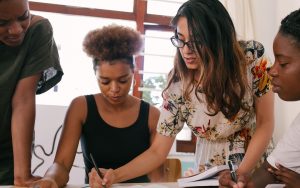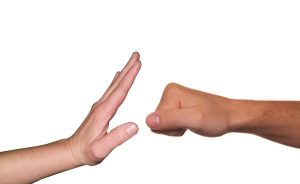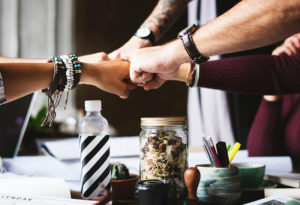Relationship building is crucial to your long-term success, both personally and professionally. Knowing how to effectively build bonds leads to more productive and enjoyable interactions across all areas of life. However, the key to mastering this vital skill lies in understanding your unique strengths. The HIGH5 strengths test offers a powerful tool to uncover your natural talents in connecting with others. By identifying and leveraging your top relationship-building strengths, you can develop more authentic, meaningful connections that drive success in both your personal life and career. As we explore the art of relationship building in this article, consider how understanding your strengths through HIGH5 can enhance your ability to form and nurture these crucial bonds
It is rare to immediately master all the soft skills needed to maintain a smoother relationship. Therefore, many give up on the benefits of relationship building.
In this article, we will highlight the best strategies to build and maintain relationships and why this skill is so important to your long-term happiness.
What is Relationship Building? Definition & Meaning
Relationship building benefits everyone, regardless of your specific job. Specifically, before you understand relationship building, you should understand the nature of relationships.
Relationships are built on honest communication, vulnerability, and active listening. When you are willing to learn about another and open up, relationships flourish. Understanding your own strengths in these areas is crucial for effective relationship building. The HIGH5 strengths test can provide valuable insights into your natural abilities for communication, empathy, and connection, allowing you to leverage these strengths in building meaningful relationships. By identifying your top relationship-building strengths, you can focus on utilizing them to create deeper, more authentic connections with others.
Both parties must feel heard and valued for a relationship to be successful. They take time to develop but are meaningful in the long run.
Pro Tip From HIGH5
Leverage your unique strengths in relationship building by taking the HIGH5 test. Once you know your top strengths, consciously apply them in your interactions. For example, if “Empathy” is one of your strengths, use it to truly understand others’ perspectives and emotions, fostering deeper connections.
Relationship building is the process of consistently communicating with someone, being an active listener, and giving up time to be with someone. It involves dedication and honesty.
Any act that contributes to how close you are to an individual is a relationship-building act. These actions aim to make your partner feel more included, valued, and heard.
Without these characteristics, a relationship cannot be strong and lacks fulfillment. When you increase your partner’s trust in you, you exhibit relationship-building behavior as well.
In general, there are many types of relationship building. In all cases, relationship building aims to strengthen the bond between you and another person/people.
Why Relationship Building is Important in Leadership & in the Workplace
In business, your network and connection are closely related to your success. Additionally, your ability to communicate with your employees and build relationships with them is equally crucial.
If you don’t have a close relationship with employees, they are unlikely to be engaged in their work. This is where understanding your strengths as a leader becomes crucial. The HIGH5 strengths test can reveal your natural leadership abilities, such as “Empowerer” or “Storyteller,” which are invaluable for building strong relationships with your team. By leveraging these strengths, you can create a more engaging work environment, foster trust, and inspire your employees to perform at their best. Remember, when leaders utilize their unique strengths in relationship building, it not only improves employee engagement but also contributes to a more positive and productive workplace culture.
The employees are also less likely to care about your company’s values, stay productive, or maintain a positive attitude.
However, if you are able to create a bond with employees, they are far more interested in working for you and doing their best at work.
Business partners are also more likely to trust you and negotiate deals with you if you have a professional work relationship with them.
However, these are not the only benefits of relationships in business.
Pro Tip From HIGH5
As a leader, use your HIGH5 test results to tailor your relationship-building approach with each team member. If “Empathizer” is one of your strengths, use it to recognize and appreciate the unique qualities and contributions of each employee, fostering stronger, more personalized connections.
List of 10 Benefits in Business Relationship Building
- Customers are more likely to reorder and have more brand loyalty
- You are more likely to negotiate deals with partners
- A large network of business partners leads to more opportunities for growth and mentorship
- Employees are more likely to listen to your instructions and respect you as a leader
- Employees are more willing to follow company values and maintain a positive attitude
- Improving relationship-building skills leads to greater leadership and communication abilities
- You get the opportunity to build long-term friendships, which can make your work more enjoyable
- Businesses that understand how to build relationships generally have a positive reputation
- You can build a network of individuals who support you with advice and financial support
- With strong relationships, you improve customer satisfaction and create more consistent cash flow. This is especially powerful in difficult times.
Relationship Building Types
While some believe relationship building is one singular type of task, there are many subcategories within this skill. They all focus on allowing you to get closer to someone.
However, many key differences exist as well. Mainly, they center around who the other individual is and what type of relationship you would like to build.
Below, we have provided a list of different relationship types.
Networking
Networking is typically associated with building a professional relationship. The term networking truly has a larger application than that.
It refers to simply meeting new individuals, regardless of their job. Networking can be done locally or via the web. Typically, you sign up for broad networking events in advance.
You will likely not know who is attending, as the focus is on meeting new people instead of acquaintances.
You may tell stories, recall your successes, understand the other person’s interests, and so on.
Being a successful networker involves capturing someone’s attention and being near-instantly likable.
Leadership
Leaders greatly benefit from relationship building. Every element of their job is improved if they have strong customer and commercial relationships.
Their team works better, customers are more satisfied, and business opportunities increase.
Once you develop a strong relationship with your team, they will to you for advice and feedback. This is a sign of trust.
Leaders who are able to unite teams and motivate them are also great at building relationships.
If you can create a singular goal that gets a group to work together harmoniously, you can foster incredible relationships.
Influencing
Influencers have a much greater reach than just impacting social media. Influencing reaches beyond the web and into the physical world.
The task of influencing involves selling or convincing individuals to have certain views, buy a product, or change their minds about something.
One common way individuals influence others is by showing exemplary behavior. By influencing your team through your relationships, you build stronger bonds.
If your team values your opinion and is influenced by your behavior, they are more likely to copy your actions and uphold company values.
Sales
If you wish to have a strong customer base, you must master the art of relationship building. Rapport and trust are necessary to get a customer to invest in your company or buy a product.
The second step of the sales pipeline, after grabbing the customer’s attention, is to convince them to believe in your mission.
If they are aligned with your values and understand the usefulness of your product, they are likely to purchase it.
Customer relation-building involves understanding their point of view: what they like, their values, needs, and motivations.
Customer Relationship
While sales involve the initial steps of customer acquisition, customer relationship building is far more long-term.
The customers who are truly invested in your brand are likely to be repeat buyers and are likely to recommend your company. In other words, customer relations are all about sustainability.
Being honest, actively listening, and caring about the customer’s needs all lead to stronger customer relationships. Indeed, customers often have a relationship with more than just your staff.
They may even associate themselves with your brand. They may align their values with yours so that they consistently refer others to your company instead of competitors.
Partner Relationship
In business, you cannot perform everything by yourself. If you wear too many hats, you cannot perform every task to the best of your ability.
This is why having great partner relationships is important. Some businesses will have separate marketing, web development, research, and supply partner.
Unfortunately, some firms believe that being exceedingly tough with partners is beneficial to their bottom line.
They may view this tension and positive pressure but are not interested in building long-term relationships and trust.
On the other hand, those that care about the long term are more likely to emphasize positive relationships and provide their partner with honest feedback.
Public Relationship
Managing and building positive relationships with the public can be overwhelming to entrepreneurs.
After all, a large number of individuals are included in this category: investors, credit lenders, the government, media reporters, local communities, online/offline influencers, and others.
Building public relations is about more than just having a PR team and occasionally doing interviews.
Instead, it is about consistently sharing your vision, being open, staying true to your values, and upholding your brand reputation.
8 Ways To Build Workplace Relationships
Anyone who wants to be trusted and valued as a leader should learn about the importance of workplace relationships.
Your workers will become more productive, start using a growth mindset, be more positive, and stay satisfied at work.
If you use emotional intelligence and communication skills, you can avoid building negative relationships. Instead, you can build genuinely positive relations.
Below are a few ways that you can improve your relationships in the workplace.
1. Understand Your Strengths and Weaknesses
Before committing to changing your behavior, it’s crucial to understand your strengths and areas for improvement. The HIGH5 strengths test offers a comprehensive assessment of your natural talents, providing clarity on your top strengths and potential areas for development. By gaining this self-awareness, you can strategically focus on leveraging your strengths while addressing any skill gaps in your relationship-building approach. For instance, if the test reveals “Relationship Builder” as one of your top strengths, you can consciously use this ability to foster connections across your workplace. Conversely, if “Empathy” is not among your top strengths, you might focus on developing this skill to enhance your relationships further.
Acknowledging your strengths also gives you a source of motivation and confidence during a time of self-development.
One key trait you can focus on is emotional intelligence, as it will help you understand your employees and form stronger connections with them. EI consists of empathy, social skills, self-awareness, and self-control.
If you are unsure of how developed each of your strengths are, consider taking an online assessment like the HIGH5 Test.
With this test, you will get clear results that detail both your strengths and weaknesses. It allows you to maximize the time you have for self-development and increases the accuracy of your strength assessments.
2. Schedule time to develop relationships
Relationships are not built overnight; they take time to develop. As a leader, you are likely constantly busy, so making time for communication can be tough.
Nonetheless, scheduling time to speak to others is the best way to commit to building relationships. Even having small periods of communication is better than ignoring employees.
Try scheduling just 10 minutes during lunch or at the end of the work day. List the individual you wish to converse with and what about in advance.
After meetings or while you walk with a friend, try catching up. If you have time after work, schedule an outing that the entire team goes on.
3. Ask questions and listen
Being a good listener is as important, if not more important, than being an effective “talker/doer.”
An added benefit of listening is learning more about your partner, which inadvertently benefits your relationships.
Show that you care about your employee by asking them about their personal life, interests, and needs. Listen to their story and desires before sharing your needs and wants.
Try to consistently ask questions and reaffirm their feelings. This will show you are engaged and paying attention to the conversation, showing you value the other person.
If you prove you are a good listener, your colleague or employee is more likely to come to you for advice, share their concerns, or invite you to celebrate success with them.
4. Offer assistance
Being a helpful person is a great way to boost a relationship. When there is an opportunity to help someone, try your best to assist them.
This could be as simple as verbal support. Or, you could help an individual by finishing a project for them or filling in for them at work when they are sick.
If you see someone is struggling with a task, offer to help them out. If someone seems down, show that you care about their feelings and ask them about their troubles.
Trust is necessary for building relationships, and if you prove you care about someone, they are likely to reciprocate that care.
5. Know when to ask for assistance
You cannot always do everything yourself. Not only is this inefficient, but it also decreases the opportunities you have for personal connection.
If you ask for assistance, you open yourself up to conversations. If you encourage colleagues to work with you, there are many chances to connect with those individuals.
Also, consider the importance of the golden rule. Whenever you help others in their time of need, they are far more likely to help you when you are struggling.
Any successful relationship involves a balance of giving and taking. You can show you are capable of both by both supporting others and being vulnerable at times.
6. Appreciate each employee’s role
Appreciation can catapult any relationship to the next level. When there are misunderstandings, negative feelings often arise.
This frustration and negativity often lead to the development of a difficult relationship. This is avoidable if you consistently show the other party how much you care about them and value them.
Keep in mind that everyone has unique talents. Recognize these talents to show you notice a colleague’s strengths.
Instead of automatically blaming others, try another strategy. Work together as a team and delegate tasks based on strengths.
By doing so, you can develop positive relationships through appreciation and recognition.
7. Keep your commitments
Trust is the fundamental building block of relationships. To increase someone’s trust, follow through in your commitments and keep your promises.
Being reliable helps establish a positive reputation for yourself. This, individuals will be more likely to trust you and count on you.
If you find yourself struggling with commitments, ensure you do not promise too much at once. Be honest with your colleagues or partner about what you can handle to avoid disappointment.
Keeping a schedule will ensure you stay organized with your promises, and increase the odds of keeping these commitments.
8. Be present in the workplace
It is easy to get overwhelmed at work. You may constantly be bombarded by tasks, stressed by deadlines, or panic when a task is not completed.
This stress, urgency, and requirement for productivity lead some to start multitasking. They may simultaneously write articles while eating lunch or be on a phone call while reading a report.
While this approach may work for some, many others see negative consequences from it. One key drawback is that multitasking limits your ability to be present and interact with others at work.
Try communicating with others when you get the chance. If you can casually get to know your coworkers, you will easily build work relationships.
Key Elements of Good Workplace Relationships
Having a flourishing relationship involves utilizing many skills. To be more specific, four main elements make up the ability to maintain quality relationships.
Understanding these elements can encourage you to improve your relationships as well as address and evaluate your weaknesses.
If you want to build a great relationship at work, focus on the characteristics listed below.
Trust
Trust forms the foundation of intimate and effective workplace relationships. It’s not freely given but earned through consistent actions and genuine interactions. Understanding your strengths through the HIGH5 test can significantly enhance your ability to build trust. For instance, if “Believer” or “Deliverer” are among your top strengths, you can leverage these to consistently follow through on commitments, thereby building trust naturally. The HIGH5 assessment provides insights into your innate abilities that contribute to trustworthiness, such as reliability, authenticity, and integrity. By consciously applying these strengths in your daily interactions, you can accelerate the trust-building process and create more meaningful, productive relationships in the workplace.
If you can acquire someone’s trust, they are more likely to invite you to more intimate settings, have deep conversations with you, and rely on you in their times of need.
In general, trust is the trait that allows your coworkers to count on you and expect you to follow through on your promises. As such, it is important for you to consistently meet your partner’s expectations.
If you promise something, ensure that you deliver. Do not make commitments on something that you cannot truly follow through with.
Acceptance
Some individuals focus on trying to change their colleagues or partners. They try to make them “perfect” instead of accepting them for who they truly are.
This is not conducive to building genuine relationships. While giving your coworkers tips on how to improve performance can be beneficial, you should not try to change their personalities.
If you cannot resist the urge to change someone, that is a sign that a relationship with them may not be possible.
Instead, try to recognize the other individual’s strengths. Praise them when they tackle their fears or achieve something outside of their comfort zone.
When it comes to their weaknesses, ask if they need any assistance in building them into strengths. If they say “no,” do not speak on the topic again.
Team member
Team players and individuals who care for the entire group are generally more appreciated than those who only look out for their own interests.
This does not mean that you should ignore your needs. Rather, try to find a way to intertwine your desires and goals with the goals of the entire organization.
Whenever you are assigned to a team project, ensure you perform a fair share of the work. Not only should you aim to complete it on time, but you should also produce high-quality work.
When someone else takes on a large role, or tries something outside of their comfort zone for the benefit of the group, applaud them.
Recognizing talent and persistence is a great way to build a relationship.
Open communication
Communication is also a vital element of any relationship, including one at work. When you openly communicate, you must be honest. Do not hide your true thoughts or feelings, for this makes you in-genuine.
On the other hand, honesty will make you a reliable individual. People will be more likely to seek your advice and opinions if you openly communicate.
Ensure your coworkers know that your email is open for questions. If they need to talk to you, let them know you are there for them.
Also, keep conversations flowing by asking questions and being engaged. All of these steps make you a better communicator and increase your odds of establishing relationships.
Frequently Asked Questions About Relationship Building
How do you demonstrate relationship-building skills?
Relationship-building skills encompass a wide array of many sub-skills. As such, there are many ways to demonstrate your ability to build relationships.
You can effectively communicate by encouraging others to come to you with questions and being an active listener.
Accepting others for who they truly are will show you know how to build relationships. Tell your colleagues that you notice their hard work and that you appreciate them.
How do you build a strong professional relationship?
Strong professional relationships can be built in numerous manners. For instance, you can build a relationship by helping others. If you see someone struggling, offer them some help.
Additionally, when you promise someone that you will perform a task, truly do so. Being a team player also increases your opportunities for relationship building.
Volunteer to take on more tasks than required whenever possible. Finally, being willing to talk to others and listening to their needs also serves as a way to build a professional relationship.








